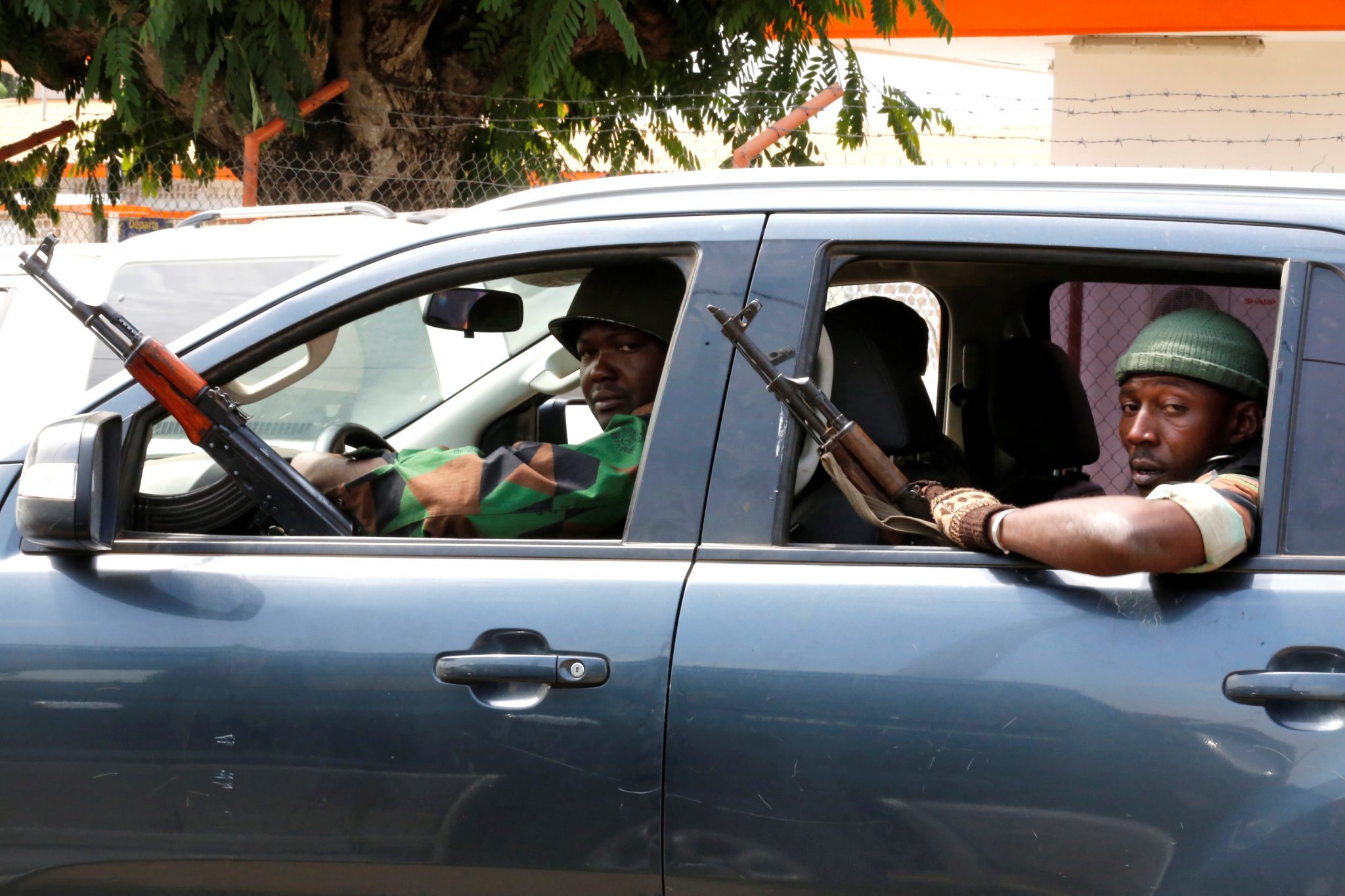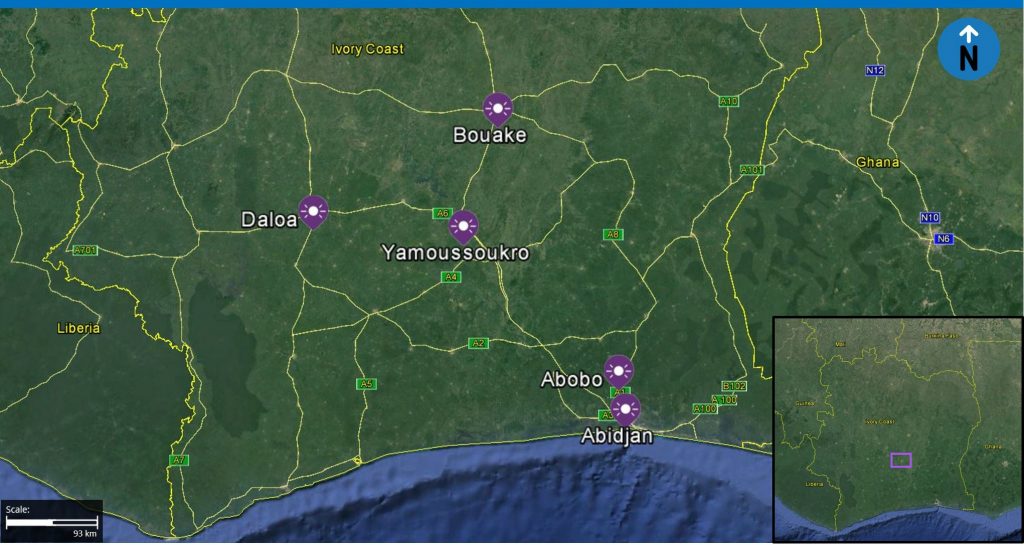Situation – Ivory Coast Mutiny and Instability:
Since January 6, Ivory Coast has been facing a wave of unrest and instability from mutinous soldiers from the various security force elements. The initial spark began on January 6, when former “Forces Nouvelle” rebels, integrated into the armed forces following the conclusion of the Ivory Coast Civil War in 2011, essentially took control of Bouake, Ivory Coast’s second largest city. The former rebels were demanding bonus payments that they allege has been owed to them as part of the disarmament, demobilization, and reintegration (DDR) process. Within hours, the mutiny spread to other area of the country, including in Abidjan, Daloa, and Yamoussoukro.
Almost immediately, President Ouattara dispatched Minister of Defense Alain-Richard Donwahi to hold negotiations with the soldiers, who were represented by their former leader and current Lieutenant-Colonel Issiaka “Wattao” Ouattara (no relation to the President). While an agreement was reached, a faction of the soldiers reportedly were not content, and effectively held the government’s delegation captive at the home of Bouake’s sub-prefect, until a date for payment of the bonuses was agreed upon. The date was eventually set for January 13.
The agreement, however, led to other issues. For one, on January 13 – the date of the payment – civilians in Bouake protested against the mutineers, leading the latter to fire warning shots to disperse them. Among others, the civilians were protesting the arrival on January 13 of 100 heavily armed mutineers to the city, who were there to partake in additional negotiations with the government. During the evening hours of January 13, communications services were cut throughout Bouake, while soldiers took control of entry and exit points to the city.
Marking the beginning of a possible trend, on January 17, soldiers in the capital, Yamoussoukro, began firing shots at the Zambakro military camp, as well as in Abidjan, and Bouake, claiming that they are entitled to similar reimbursements as the original mutineers. The soldiers in Yamoussoukro, began looting shops and seizing vehicles and weapons from their base. Republic Guards fired upon the mutineers, killing two. The soldiers, who were demanding a more comprehensive deal incorporating the entirety of Ivorian security forces, eventually agreed to stop their actions during the evening hours of January 17, likely to engage in discussions with the government.
That said, during the morning hours of January 18, gendarmes discontent with the arrears given to disgruntled soldiers participating in a mutiny in Bouake blocked access to certain parts of the Autonomous Port of Abidjan in the vicinity of the fishing port located in the Treichville commune. Additional sources suggest that gendarmes also raided the headquarters of Abidjan Transport Company (SOTRA) during the morning hours of January 18, demanding the evacuation of the personnel inside the building. Meanwhile, reports indicate that gunfire were reported in the vicinity of Bouake prison, also during the morning hours of January 18. Further reports suggest that prison guards started to surround the prison, demanding arrears payments. The following day, reports indicate that gunfire was heard at the Akouedo base, located in the Cocody suburban commune of Abidjan.
Assessment & Forecast:
The Ivory Coast mutiny has continued to unfold as payments of considerable arrears to a limited number of ex-Forces Nouvelles rebels within the military has triggered additional waves of protests throughout the Ivorian security forces at large, as witnessed in the aforementioned developments, and unrest witnessed in Yamoussoukro and Abidjan starting on January 17. Said protests and demands for pay are likely to have been engendered by resentment over the deal brokered with the ex-Forces Nouvelles troupes and/or a desire to exploit the Ivorian government’s apparently willingness to acquiesce to such demands.
While the Akouedo mutineers are suspected to be soldiers of the late Defense and Security Forces (FDS) assembled in 2011 with the Forces Nouvelles rebels to form the current Ivorian military, the discontent of the security forces appears widespread and not restricted to particular groups. As such, additional unrest triggered by elements of the security forces, beyond former members of the Forces Nouvelles, are anticipated over the coming days. Whilst the government may agree to come to terms with discontent individuals, ending particular instances of unrest, such resolutions are liable to be temporary
Finally, we assess that the current Ivory Coast mutiny within the security services carries some potential to result in an uptick in criminal behavior, as lawless elements attempt to exploit the ongoing unrest in order perpetrate illicit actions nationwide, particularly given disquiet witnessed within the gendarmerie. In particular, Ivory Coast’s outlying areas are already subject to a relatively high risk of criminality, with criminal gangs having successfully entrenched themselves as a result of limited security infrastructure. It is therefore plausible that a further decline in security force presence or activity will be leveraged by these existing actors.
Recommendations:
Those operating or residing in the country are advised to be vigilant of the Ivory Coast mutiny, and are advised to avoid the vicinity of government and security force installations over the coming days, as well as any large gatherings, given the current volatility and potential for violence at these sites.


